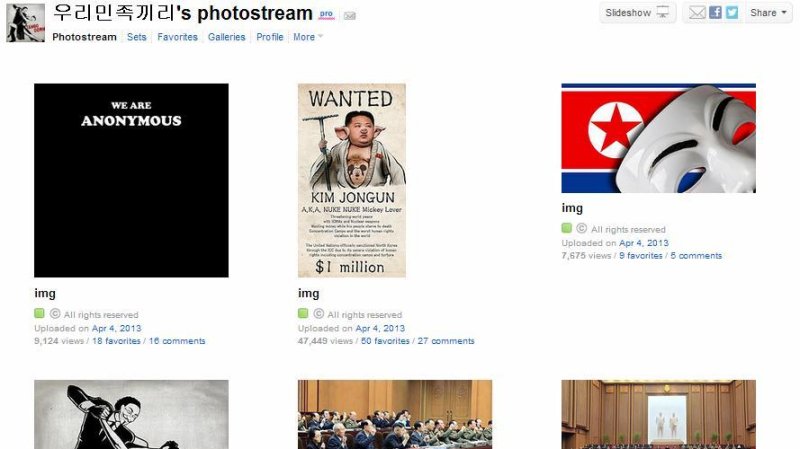1 of 4 |
"Hacktivist" collective Anonymous taken taken credit for hijacking two of North Korea's social media pages, as tensions with the U.S., South Korea and other countries escalate, BBC News reported.
Anonymous hacked into the Twitter and Flickr accounts belonging to Uriminzokkiri, an official propaganda site run by North Korea's central news agency on Thursday.
The two accounts usually post photos and information regarding Kim Jong Un and his military plans, but the North Korean Flickr now shows a picture of the "Dear Leader" with a pig snout and ears, and a Mickey Mouse emblazoned on his chest.
Uriminzokkiri's Twitter feed, which has a new avatar, posted a series of tweets that read "hacked."
Anonymous addressed the breach in a statement: "To the citizens of North Korea we suggest to rise up and bring [this] oppressive government down!"
"You are not alone. Don't fear us, we are not terrorist, we are the good guys from the internet. AnonKorea and all the other Anons are here to set you free."
CNET points to an Anonymous post on Pastebin explaining how North Korea's Intranet was hacked:
"We happily noticed you questioned how we could be inside Kwangmyong, the country-wide intranet of N.K., because we think it's good journalism to doubt and question things. We have a few guys on the ground who managed to bring the real internet into the country using a chain of long distance WiFi repeaters with proprietary frequencies, so they're not jammed (yet). We also have access to some N.K. phone landlines which are connected to Kwangmyong through dial-ups. Last missing peace of puzzle was to interconnect the two networks, which those guys finally managed to do."
Anonymous also claimed to have acquired 15,000 passwords along with access to the country's private Intranet system. But The Washington Post's Caitlin Dewey reported Thursday that some analysts question Anonymous' purported success.
"The network is insulated from the outside world and not accessible outside the country," Dewey wrote. "You can’t get to it from the Internet because it’s not on the Internet."








